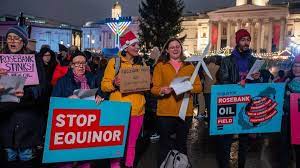LONDON (BBC): Countries should secure supplies of oil and gas by sourcing locally, the boss of energy giant Equinor has said. Anders Operdal told the BBC energy security should be top of the agenda after Russia’s invasion of Ukraine saw supplies disrupted and prices hiked.
Equinor is the biggest investor in the Rosebank oil field in the North Sea – the largest new UK oil and gas field development in decades. But critics say new oil fields will not make UK energy supplies more secure. They argue a faster transition away from fossil fuels is a better strategy to ensure more stable energy prices. It was given the green light the day after the International Energy Agency announced that any new oil and gas developments were inconsistent with an international target of keeping the global temperature from rising more than 1.5 degrees above pre-industrial levels. But Mr Opedal defended Equinor’s investment in Rosebank, pointing to the impact of Russia’s invasion of Ukraine on supplies of oil and gas to Europe.
“One of the key learnings from 2022 is that energy security needs to be on top of the agenda, together with affordability and sustainability,” he said.
“Each country needs to, I think, look harder into producing the energy they need closer to home, and that’s really what we are working on to make sure we can supply Europe, the UK, with gas and oil these days and for decades to come.” Mr Opedal said that Equinor was taking what he described as “a balanced view” of the transition away from fossil fuels. He said that investment in renewables would rise from its current 20% of capital expenditure to 50% by 2030. “We are investing in Rosebank but we are also investing in Dogger Bank – the world’s largest windfarm,” he said.
“We know that, in time, demand for oil and gas will decline and we are preparing our company for that. We are investing in the energy of the future while supplying the energy the world needs now,” he said.
However, there is a chorus of voices opposing new investment in oil and gas, arguing it makes countries less secure. The head of the United Nations, António Guterres, said in 2022 that investment in new oil and gas was “economic and moral madness”. Piers Forster, the interim chair of parliament’s Climate Change Committee said by contrast shifting to renewables would help keep prices stable. “The more we reduce our dependence on fossil fuels that are sold on international markets, the less energy prices will fluctuate,” he said. Most oil produced in UK waters is not sold directly onto the UK market, but is traded by the private companies that extract it, with the price set by the global market.
Much of the UK’s North Sea gas does come into the country, but still at internationally determined prices.
North Sea oil and gas claims fact-checked Claire Fyson, from the think tank, Climate Analytics, said the UK should be cutting fossil fuel use by 6% a year rather than investing in new developments.
“Numerous studies have shown we’ll have a big surplus in fossil fuels if planned projects go ahead, creating huge risks for not only the climate but also the economy,” she said.







